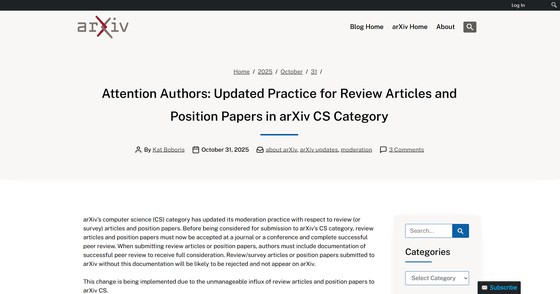Why is arXiv, the repository of unpeer-reviewed papers, now requiring peer review for computer science papers?

arXiv, a preprint site that publishes papers before peer review, has updated its procedures for handling papers in the computer science category, making it a requirement that review papers and position papers that express opinions must have completed the peer review process. From now on, review papers and position papers in the computer science category will not be posted on arXiv unless they have been officially accepted through peer review by a conference or journal.
Attention Authors: Updated Practice for Review Articles and Position Papers in arXiv CS Category – arXiv blog

Preprint site arXiv is banning computer-science reviews: here's why
https://www.nature.com/articles/d41586-025-03664-7
Operated by Cornell University Library, arXiv is a website that stores and publishes papers, including preprints, in a variety of fields, including physics, mathematics, biology, economics, and computer science. It allows researchers to publish their papers directly online, bypassing academic journals and university libraries.
In a blog post published on October 31, 2025, arXiv announced that review articles and position papers submitted to the Computer Science category will now be required to be accepted by a peer review organization, such as a journal or conference, and to complete a full peer review process before submission. At the time of submission, authors will be required to submit documentation proving peer review completion; failure to do so will result in the paper not being published on arXiv and at a high risk of being rejected. Peer review conducted at a workshop held alongside a conference is generally considered insufficient to meet this requirement.

arXiv explains that the reason for this change is an unmanageable surge in submissions in the computer science category.
The advent of generative AI and large-scale language models (LLMs) has made it quick and easy to write papers that don't contain new research results, but as a result, the majority of review articles are low-quality, lacking substantive discussion and amounting to mere annotated bibliographies. This has resulted in a situation where volunteer moderators are unable to devote their time to the original purpose of sharing research results quickly.
According to Steinn Sigurdsson, an astrophysicist at Pennsylvania State University and the scientific director of arXiv, only 2-3% of submissions were ultimately rejected until around 2023, but by 2024, that number had risen to 10%.
The main purpose of this change is two-fold: one is to make it easier for readers to find valuable papers by experts, and the other is to allow moderators to focus on their primary job of reviewing research papers and reduce the time it takes for papers to be published. arXiv states that if there is a sudden increase in similar papers by LLMs in other categories, it may apply the same operational changes as it did in the Computer Science category.

On the other hand, arXiv's new practices have raised some concerns from the research community.
In the comments section of the arXiv blog, some people pointed out that 'research papers need to be up-to-date, and that their content may become outdated while waiting for peer review.' Furthermore, some people fear that the peer review process itself is losing credibility due to the rise of 'predatory journals,' while peer review for high-quality journals can take more than a year. They also fear that low-quality papers will be published on arXiv first and become established as 'standard references.'
Related Posts:
in Free Member, Web Service, Science, Posted by log1i_yk







